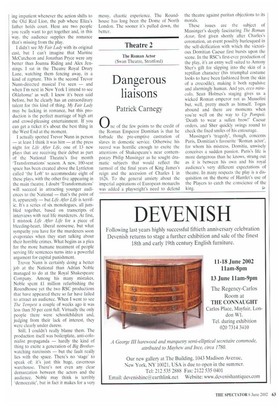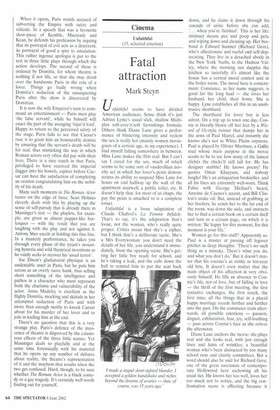Theatre 2
The Roman Actor (Swan Theatre, Stratford)
Dangerous liaisons
Patrick Camegy
0 ne of the few points to the credit of the Roman Emperor Domitian is that he forbade the pre-emptive castration of slaves in domestic service. Otherwise his record was horrific enough to excite the attentions of Shakespeare's near contemporary Philip Massinger as he sought dramatic subjects that would reflect the turmoil of the final years of King James's reign and the accession of Charles I in 1626. To the general anxiety about the imperial aspirations of European monarchs was added a playwright's need to defend
the theatre against puritan objections to its morals.
These issues are the subject of Massinger's deeply fascinating The Roman Actor, first given shortly after Charles's coronation, an event possibly burlesqued in the self-deification with which the victorious Domitian Caesar first bursts upon the scene. In the RSC's first-ever production of the play, it's an entry well suited to Antony Sher's gift for slipping into the skin of a reptilian character (his triumphal costume looks to have been fashioned from the skin of a crocodile), making it both repulsive and alarmingly human. And yes, ecco miracolo, Sean Holmes's staging gives us a wicked Roman emperor not as Mussolini but, well, pretty much as himself. Togas abound and there are moments when you're well on the way to Up Pompeii. 'Death to wear a sullen brow!' Caesar orders, and Sher quickly swings round to check the fixed smiles of his entourage.
Massinger's 'tragedy', though, concerns Paris, Domitian's favourite 'Roman actor', for whom his mistress, Domitia, unwisely conceives a sudden passion. Paris's life is more dangerous than he knows, strung out as it is between his own and his royal audience's very different expectations of theatre. In many respects the play is a disquisition on the theme of Hamlet's use of the Players to catch the conscience of the
king. r>
When it opens, Paris stands accused of subverting the Empire with satire and ridicule. In a speech that was a favourite show-piece of Kemble, Macready and Kean, he defends his profession by arguing that its portrayal of evil acts as a deterrent, its portrayal of good a spur to emulation. This rather ingenue apologia is put to the test in three little plays through which the action develops. The second of these is ordered by Domitia, for whom theatre is nothing if not life, so that she may drool over the handsome Paris in the role of a lover. Things go badly wrong when Domitia's seduction of the unsuspecting Paris after the show is discovered by Domitian.
It is now the wily Emperor's turn to command an entertainment — Paris must play the false servant', while he himself will enact the part of the avenging injur'd lord'. Happy to return to the perceived safety of the stage, Paris fails to see that Caesar's ruse is to grant him an honourable demise by ensuring that the servant's death will be for real, thus mimicking the way in which Roman actors very often did pay with their lives. There is a nice touch in that Paris, privileged to have received the imperial dagger into his bowels, expires before Caesar can have the satisfaction of completing an oration congratulating him on the nobility of his death.
Many such moments in The Roman Actor teeter on the edge of farce. Sean Holmes cleverly deals with this by playing up the sense of self-parody that is already there in Massinger's text — the playlets, for example, are given as almost puppet-like burlesques — with the result that you are laughing with the play and not against it. Antony Sher excels at holding this fine line. In a masterly performance, he takes you through every phase of the tyrant's mounting hysteria and wild theatrical inventions as he vainly seeks to recover his 'usual terror'.
Joe Dixon's gladiatorial physique is an undeniable asset in Paris, but he puts him across as an overly naive hunk, thus selling short something of the intelligence and pathos in a character who must represent both the charisma and vulnerability of the actor. Anna Madeley is excellent as the flighty Domitia, mocking and skittish in her attempted seduction of Paris and with more than enough mettle to knock Caesar about for his murder of her lover and to join in knifing him at the end.
There's no question that this is a very strange play. Paris's defence of the innocence of theatre is disproved by the calamitous effects of the three little scenes. Yet Massinger deals so playfully and at the same time forensically with his material that he opens up any number of debates about reality, the theatre's representation of it and the mayhem that results when the two get confused. Hard, though, to be sure whether The Roman Actor is a black comedy or a gay tragedy. It's certainly well worth finding out for yourself.























































































 Previous page
Previous page